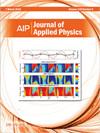Focus control of a concave–convex ultrasonic gel lens in the radial direction
IF 2.5
3区 物理与天体物理
Q2 PHYSICS, APPLIED
引用次数: 0
Abstract
Optical image stabilization (OIS) systems maintain the three-dimensional focal position of a lens through mechanical actuation systems. This paper examines an optical lens for OIS that utilizes ultrasound vibration to alter the focal position, not only in the depth direction but also in the radial direction. The lens has a simple structure with no mechanical moving parts and consists of an ultrasound transducer divided into four pieces, a glass disk, and a transparent viscoelastic gel film that functions as a lens. The acoustic radiation force generated by the resonant flexural vibration of the glass disk can alter the surface profile of the gel film, allowing for a variable-focus function. The concave and convex lenses can be interchanged using two resonant vibration modes: the standing-wave mode, in which the vibration loop appears at the center, and the traveling-wave mode, in which the vibration node appears at the center. The positions of ultrasound vibrations on the lens can be controlled in a two-dimensional plane by adjusting the driving amplitudes of each channel, thereby achieving focus control in the radial direction. The focusing characteristics of the lens are evaluated through ray-tracing simulation.凹凸超声波凝胶透镜径向聚焦控制
光学图像稳定(OIS)系统通过机械致动系统保持透镜的三维焦点位置。本文研究了一种用于 OIS 的光学透镜,它利用超声波振动来改变焦距位置,不仅在深度方向上,而且在径向方向上也是如此。该透镜结构简单,没有机械运动部件,由分成四块的超声换能器、玻璃圆盘和充当透镜的透明粘弹性凝胶薄膜组成。玻璃盘的共振弯曲振动产生的声辐射力可以改变凝胶膜的表面轮廓,从而实现可变焦距功能。凹透镜和凸透镜可通过两种共振振动模式进行互换:立波模式和行波模式,前者的振动环出现在中心位置,后者的振动节点出现在中心位置。通过调整每个通道的驱动振幅,可在二维平面上控制透镜上超声波振动的位置,从而实现径向聚焦控制。通过光线跟踪模拟评估了透镜的聚焦特性。
本文章由计算机程序翻译,如有差异,请以英文原文为准。
求助全文
约1分钟内获得全文
求助全文
来源期刊

Journal of Applied Physics
物理-物理:应用
CiteScore
5.40
自引率
9.40%
发文量
1534
审稿时长
2.3 months
期刊介绍:
The Journal of Applied Physics (JAP) is an influential international journal publishing significant new experimental and theoretical results of applied physics research.
Topics covered in JAP are diverse and reflect the most current applied physics research, including:
Dielectrics, ferroelectrics, and multiferroics-
Electrical discharges, plasmas, and plasma-surface interactions-
Emerging, interdisciplinary, and other fields of applied physics-
Magnetism, spintronics, and superconductivity-
Organic-Inorganic systems, including organic electronics-
Photonics, plasmonics, photovoltaics, lasers, optical materials, and phenomena-
Physics of devices and sensors-
Physics of materials, including electrical, thermal, mechanical and other properties-
Physics of matter under extreme conditions-
Physics of nanoscale and low-dimensional systems, including atomic and quantum phenomena-
Physics of semiconductors-
Soft matter, fluids, and biophysics-
Thin films, interfaces, and surfaces
 求助内容:
求助内容: 应助结果提醒方式:
应助结果提醒方式:


